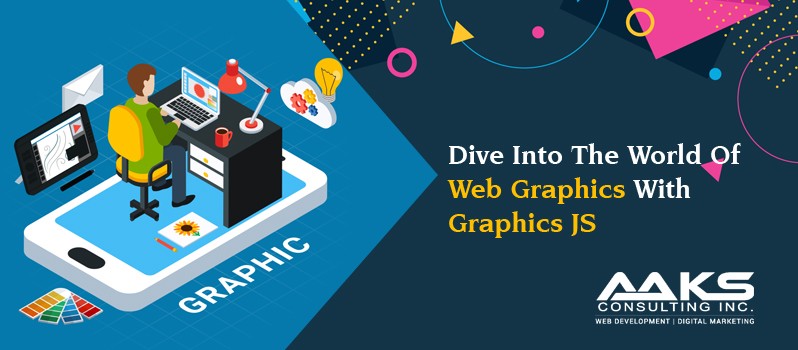Dive Into The World Of Web Graphics With GraphicsJS
Dive Into The World Of Web Graphics With GraphicsJS, Creating stunning visuals for your website can be a daunting task. From selecting the right colors to deciding on the perfect layout, it takes a lot of time and effort. Thanks to GraphicsJS, you can now easily create captivating visuals that will draw in visitors to your site. Find out why this cutting-edge technology is revolutionizing the web graphics industry!
What is GraphicsJS?
GraphicsJS is a JavaScript library for drawing graphics on web pages. It is lightweight and fast, and it supports both vector and raster graphics. With GraphicsJS, you can create shapes, lines, curves, and images with ease. The library is also extendable, so you can add your own custom functionality if needed.
Benefits of Using GraphicsJS
If you’re looking for a comprehensive and easy-to-use graphics library for your web projects, GraphicsJS is definitely worth checking out. In this article, we’ll take a look at some of the key benefits of using GraphicsJS.
1. It’s free and open source
GraphicsJS is released under the Apache 2.0 license, which means it’s free to use in both commercial and personal projects. Plus, being open source means that the code is available for anyone to inspect, so you can be confident that it’s well-written and trustworthy.
2. It has a simple API
Even if you’re not a experienced developer, you should be able to pick up GraphicsJS fairly easily thanks to its straightforward API. All the main methods are clearly documented, so you shouldn’t have any trouble getting started.
3. It’s lightweight but powerful
Despite its relatively small size (the minified version is just over 9kb), GraphicsJS packs a lot of punch. It supports all the major web browsers (including IE9+) and offers a wide range of features, such as gradients, shadows, animations, and more.
4. It’s constantly being improved
The team behind GraphicsJS are regularly releasing new versions with bug fixes and new features. They’re also very responsive to feedback from users, so if there’s something you’d like to see added or changed, let them know!
In summary, GraphicsJS is a great choice for anyone looking for a powerful yet simple graphics library. It’s free to use, it has an easy-to-understand API, and it’s constantly being improved. So why not give it a try today?
How to Get Started with GraphicsJS
Creating beautiful web graphics doesn’t have to be difficult. With GraphicsJS, you can easily create stunning visualizations for your website or blog. Here’s how to get started:
1. Choose your graphic. GraphicsJS offers a wide range of pre-made graphics, or you can create your own from scratch.
2. Customize your graphic. You can change the colors, size, and shape of your graphic to suit your needs.
3. Add interactive features. GraphicsJS supports interactivity, so you can add features like tooltips and links to your graphic.
4. Embed your graphic on your website or blog. Once you’re happy with your creation, simply embed the code on your site to share it with the world!
Examples of What You Can Create with GraphicsJS
With GraphicsJS, you can create a wide variety of graphics for your web projects. Here are just a few examples of what you can create:
-Logos and branding elements
-Icons and buttons
-Webpage layouts
-Charts and diagrams
-Animations and effects
Tips for Working with GraphicsJS
When working with GraphicsJS, there are a few things to keep in mind in order to get the most out of the library. First, be sure to include the graphicsjs.min.js file in your project. Next, create a new instance of the Graphics class and set the width and height properties accordingly. Finally, add objects to the stage by using the addChild method.
GraphicsJS is a great tool for creating dynamic and interactive web graphics. By following these simple tips, you can make the most out of this powerful library.
Alternatives to GraphicsJS
There are many ways to create graphics on the web. In addition to GraphicsJS, there are other libraries and frameworks that can be used to create interactive and animated graphics. Some of these alternatives include:
– HTML5 Canvas: Canvas is a low-level drawing API that is part of the HTML5 standard. It enables developers to draw 2D shapes and images on a web page.
– SVG: Scalable Vector Graphics (SVG) is a vector graphic format that can be used to create scalable images for the web.
– WebGL: Web Graphics Library (WebGL) is a JavaScript API for rendering 3D graphics in the browser. It is based on OpenGL and allows developers to create interactive 3D applications without having to install any plugins.
Conclusion
Web graphics are a great way to add visual interest and appeal to your website. With GraphicsJS, you can dive into the world of web graphics with ease and create beautiful visuals for your site. Whether you’re looking for simple shapes or more complex animations, GraphicsJS has everything you need to bring your website’s design to life. So get out there and explore the possibilities that web graphics have to offer—you won’t regret it!




